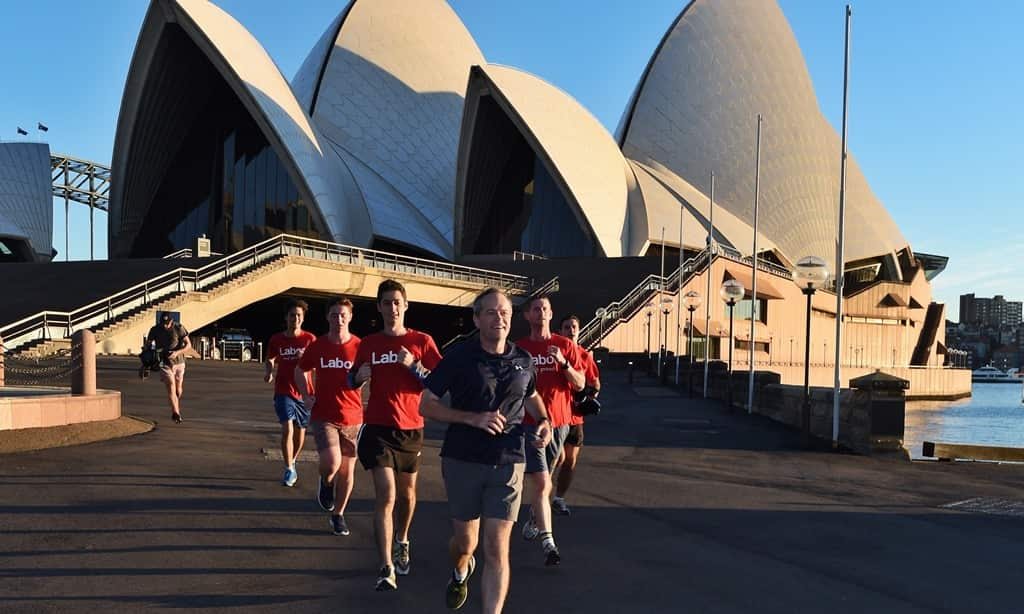Man boobs and Panama. So ends the first week of Australia’s longest ever election campaign since 1969.
We’re only 5 days in with more than 50 to go but it feels like we’ve managed to capture the entire cycle of a campaign in this short period. We’ve had (some) serious policy debate, completely over the top tabloid front pages, internal party divisions and interjections by the ghosts of former opposition leaders (former Labor leader Mark Latham popped up to give Bill Shorten some helpful advice on how to manage his “man boobs”).
It’s hard to imagine politicians and journalists keeping up the frenetic pace of this already quite weird campaign for another seven weeks, but alas that’s what the Prime Minister has consigned us all to.
There were three big issues that became showstoppers this week and demonstrated that despite how hard political parties work to craft strategies and messaging, unforeseen events can derail the most meticulously planned campaign schedules.
The first was the messy and complex three-way fight between the Liberal party, Labor and The Greens over preference deals.
Anthony Albanese, a factional heavyweight from the left-wing of the Labor Party, held his seat of Grayndler in Sydney’s inner-west at the last election with a pretty safe margin. But this time around he’s worried about the rising threat from the Greens, who have preselected Jim Casey, a local firefighter, to challenge him.
Here’s where it gets interesting: despite the fact that the inner-west is lefty stronghold, it could actually be the Liberals who decide who wins the seat. If the Liberals recommend preferences to Labor (like they did last election), it all but secures Albanese another term. But if they decide to preference the Greens (as they did in 2010), it’s game on.
Albanese has been crying foul about an alleged preference deal between the Liberals and the Greens, and his regular press conferences denouncing the Greens ensured that the contest in Grayndler received massive media attention in the first week of the campaign. He also managed to secure the backing of The Daily Telegraph, who published a front page imploring voters to “Save Our Albo”. It’s unclear what impact the Tele has in the progressive boroughs of Marrickville and Balmain, but the story cemented the Grayndler campaign as one of the most interesting to watch this election.
Labor had another fight on its hands this week, but this one was more internally focused. Bill Shorten’s plan to spend the week talking about education policy was derailed when it emerged that a number of high profile Labor candidates didn’t actually support the party’s refugee policy. Refugee issues have been internally divisive within the Labor party for a number of years, with some MP’s and party members uncomfortable with the party’s support for offshore detention and boat turn backs. The issue for Shorten is that he’s desperate to not look “weak” on the issue of border protection, but some of his own candidates are anxious about losing votes to the Greens. With Papua New Guinea announcing it will shut down the Manus Island detention centre, it’s likely refugee policy will play a bigger role in the election campaign. It’s going to be interesting to see how Shorten balances the different tensions within his party on the issue.
The issue for Shorten is that he’s desperate to not look “weak” on the issue of border protection, but some of his own candidates are anxious about losing votes to the Greens. With Papua New Guinea announcing it will shut down the Manus Island detention centre, it’s likely refugee policy will play a bigger role in the election campaign. It’s going to be interesting to see how Shorten balances the different tensions within his party on the issue.

Leader of the Opposition Bill Shorten runs past the Sydney Opera House as part of the 2016 election campaign in Sydney, Friday, May 13, 2016. Source: AAP
Malcolm Turnbull crisscrossed the country spruiking his “jobs and growth” agenda, the two pillars of which are corporate tax cuts and a new internship program for young job seekers, the latter having already been roundly condemned by unions as “akin to slave labour”. Unfortunately it all went a bit awry for the Prime Minister when it emerged he had been named in the infamous “Panama Papers”. The documents didn’t indicated any specific wrongdoing, but for some bizarre reason the PM decided to wheel out controversial Senator Arthur Sinodinos to defend his actions. It’s too early to assess the political fallout, but Labor has made it clear it believes the issue is a “serious matter”.
So where does that all leave us at the end of week one? The polls have narrowed considerably since Turnbull first became Prime Minister, and some have put the two party preferred result at 50-50. The MetaPoll aggregate of all the published opinion polls shows the Coalition slightly ahead, leading Labor 50.7 to 49.3.
The problem with assessing national opinion polls at this stage is that they don’t necessarily reflect the varying results state by state and what’s happening in crucial marginal seats. But we do know that it’s looking like a close election, and that’s kicked off discussion about the potential for a hung Parliament, where neither Labor nor the Coalition win the 76 seats needed to form a majority. The closer the race gets the more attention we’ll see shift to the Greens and independents like Tony Windsor and Nick Xenophon who could end up holding the balance of power and deciding who forms government.
In addition to scrutinising the policies of the major parties, it would make sense to try and nail down what the minor parties and independents are prioritising over the course of the campaign, just in case they end up holding the keys to the kingdom.
Share

